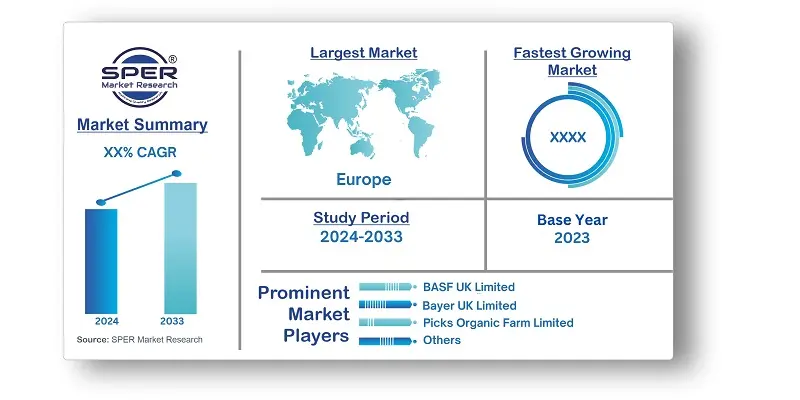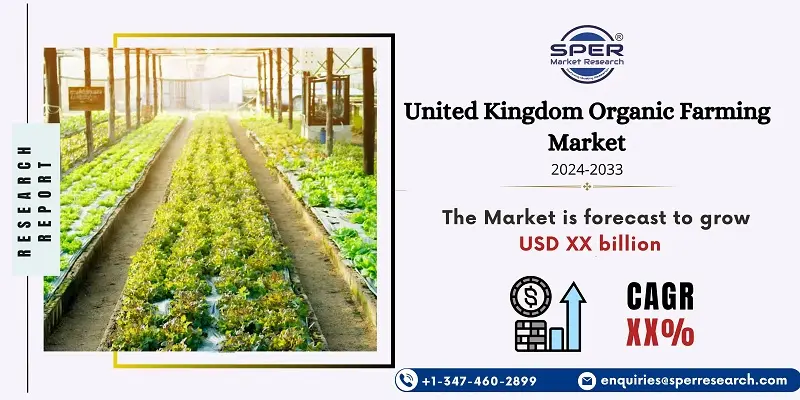
United Kingdom Organic Farming Market Growth, Size, Trends, Demand, Share and Future Outlook
United Kingdom Organic Farming Market Size- By Food Type, By Method- Regional Outlook, Competitive Strategies and Segment Forecast to 2033
| Published: Jun-2024 | Report ID: AGRI2422 | Pages: 1 - 105 | Formats*: |
| Category : Agriculture | |||
- April 2024; Reviving the UK's organic industry is the goal of UK Organic, a Community Interest Company that was formerly the Organic Trade Board (OTB). UK Organic presented its plan to become the industry's marketing agency at its first annual conference. The plan aims to address the current decline in organic sales volumes by bringing the supply chain together and igniting consumer interest.
- May 2024; Leading supermarket chain Waitrose strengthened the UK's organic supply chain by increasing its commitment to sourcing organic produce locally and diversifying its line of organic products.


| Report Metric | Details |
| Market size available for years | 2020-2033 |
| Base year considered | 2023 |
| Forecast period | 2024-2033 |
| Segments covered | By Food Type, By Method. |
| Regions covered | South-East, London, South-West, East- Anglia, Yorkshire & Humberside, East Midlands, Scotland, Rest of United Kingdom. |
| Companies Covered | BASF UK Limited, Bayer UK Limited, Picks Organic Farm Limited, Riverford Organic Farmers Ltd, Solvay S.A, Others. |
- Market Players
- Investors
- End-users
- Government Authorities
- Consulting and Research Firm
- Venture Capitalists
- Value-Added Resellers (VARs)
| By Food Type: |
|
| By Method: |
|
- United Kingdom Organic Farming Market Size (FY’2024-FY’2033)
- Overview of United Kingdom Organic Farming Market
- Segmentation of United Kingdom Organic Farming Market By Food Type (Oilseeds and Pulses, Fruits and Vegetables, Cereals and Grains, Organic Livestock)
- Segmentation of United Kingdom Organic Farming Market By Method (Weed Management, Crop Rotation, Mulching, Cutting, Composting, Soil Management, Polyculture)
- Statistical Snap of United Kingdom Organic Farming Market
- Expansion Analysis of United Kingdom Organic Farming Market
- Problems and Obstacles in United Kingdom Organic Farming Market
- Competitive Landscape in the United Kingdom Organic Farming Market
- Impact of COVID-19 and Demonetization on United Kingdom Organic Farming Market
- Details on Current Investment in United Kingdom Organic Farming Market
- Competitive Analysis of United Kingdom Organic Farming Market
- Prominent Players in the United Kingdom Organic Farming Market
- SWOT Analysis of United Kingdom Organic Farming Market
- United Kingdom Organic Farming Market Future Outlook and Projections (FY’2024-FY’2033)
- Recommendations from Analyst
1.1. Scope of the report1.2. Market segment analysis
2.1. Research data source2.1.1. Secondary Data2.1.2. Primary Data2.1.3. SPER’s internal database2.1.4. Premium insight from KOL’s2.2. Market size estimation2.2.1. Top-down and Bottom-up approach2.3. Data triangulation
4.1. Driver, Restraint, Opportunity and Challenges analysis4.1.1. Drivers4.1.2. Restraints4.1.3. Opportunities4.1.4. Challenges4.2. COVID-19 Impacts of the United Kingdom Organic Framing Market.
5.1. SWOT Analysis5.1.1. Strengths5.1.2. Weaknesses5.1.3. Opportunities5.1.4. Threats5.2. PESTEL Analysis5.2.1. Political Landscape5.2.2. Economic Landscape5.2.3. Social Landscape5.2.4. Technological Landscape5.2.5. Environmental Landscape5.2.6. Legal Landscape5.3. PORTER’s Five Forces5.3.1. Bargaining power of suppliers5.3.2. Bargaining power of buyers5.3.3. Threat of Substitute5.3.4. Threat of new entrant5.3.5. Competitive rivalry5.4. Heat Map Analysis
6.1. United Kingdom Organic Framing Market Manufacturing Base Distribution, Sales Area, Product Type6.2. Mergers & Acquisitions, Partnerships, Product Launch, and Collaboration in United Kingdom Organic Framing Market
7.1. United Kingdom Organic Framing Market Size, Share and Forecast, By Food Type, 2020-20267.2. United Kingdom Organic Framing Market Size, Share and Forecast, By Food Type, 2027-20337.3. Oilseeds and Pulses7.4. Fruits and Vegetables7.5. Cereals and Grains7.6. Organic Livestock
8.1. United Kingdom Organic Framing Market Size, Share and Forecast, By Method, 2020-20268.2. United Kingdom Organic Framing Market Size, Share and Forecast, By Method, 2027-20338.3. Weed Management8.4. Crop Rotation8.5. Mulching8.6. Cutting8.7. Composting8.8. Soil Management8.9. Polyculture
9.1. United Kingdom Organic Framing Market Size and Market Share
10.1. United Kingdom Organic Framing Market Size and Market Share By Region (2020-2026)
10.2. United Kingdom Organic Framing Market Size and Market Share By Region (2027-2033)
10.3. United Kingdom10.3.1. South-East10.3.2. London10.3.3. South-West10.3.4. East- Anglia10.3.5. Yorkshire & Humberside10.3.6. East Midlands10.3.7. Scotland10.3.8. Rest of United Kingdom
11.1. BASF UK Limited11.1.1. Company details11.1.2. Financial outlook11.1.3. Product summary11.1.4. Recent developments11.2. Bayer UK Limited11.2.1. Company details11.2.2. Financial outlook11.2.3. Product summary11.2.4. Recent developments11.3. Picks Organic Farm Limited11.3.1. Company details11.3.2. Financial outlook11.3.3. Product summary11.3.4. Recent developments11.4. Riverford Organic Farmers Ltd11.4.1. Company details11.4.2. Financial outlook11.4.3. Product summary11.4.4. Recent developments11.5. Solvay S.A11.5.1. Company details11.5.2. Financial outlook11.5.3. Product summary11.5.4. Recent developments11.6. Others
SPER Market Research’s methodology uses great emphasis on primary research to ensure that the market intelligence insights are up to date, reliable and accurate. Primary interviews are done with players involved in each phase of a supply chain to analyze the market forecasting. The secondary research method is used to help you fully understand how the future markets and the spending patterns look likes.
The report is based on in-depth qualitative and quantitative analysis of the Product Market. The quantitative analysis involves the application of various projection and sampling techniques. The qualitative analysis involves primary interviews, surveys, and vendor briefings. The data gathered as a result of these processes are validated through experts opinion. Our research methodology entails an ideal mixture of primary and secondary initiatives.



Frequently Asked Questions About This Report
PLACE AN ORDER
Year End Discount
Sample Report
Pre-Purchase Inquiry
NEED CUSTOMIZATION?
Request CustomizationCALL OR EMAIL US
100% Secure Payment






Related Reports
Our Global Clients
Our data-driven insights have influenced the strategy of 200+ reputed companies across the globe.




















